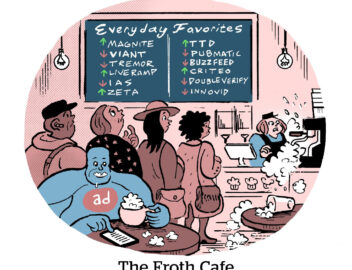

Thank you!
Just one more thing before you go...

Consumer First, The Advertising Of Tomorrow
In January 2020, Google dropped a bombshell on the marketing technology industry by announcing the impending depreciation of the cookie across its Chrome browser. On the heels of the headaches that came with GDPR and CCPA compliance, Google’s announcement shook the foundations of data-driven marketers everywhere. And as a seasoned Adtech executive who built his career as a data broker, I understood the implications of these privacy changes, perhaps better than most. Long gone were the wild west days of digital advertising where the CPMs were low, traffic was plentiful and the data flowed freely.
While Google has since pushed back its timeline for a cookieless world, other privacy-oriented changes have cropped up. Most recently, and perhaps most relevantly, Apple’s iOS 14 update, which requires apps to request user permission to track them across their devices, has had an immediate impact on mobile advertising. And as tech companies rush to figure out alternative solutions through a series of bird-themed working groups, publishers and marketers are going back to their roots: email.
You may have noticed lately as you browse the web, more and more publishers are requiring an email address simply to access their content. Even retailers are requiring this more frequently just to view their products. As a marketer, you yourself, may have shifted strategy in a bid to rebuild your email lists. With cookies and device IDs becoming more regulated and scarce, email has become the new unique identifier.
Yet, when we put ourselves in the shoes of the consumer, is the increased use of email marketing really the intended result of all this privacy regulation? I could argue that someone’s email address is the key to their digital identity – the equivalent of a social security number, a cell phone number, or a home address. Is email really a more secure and private identifier than the cookie or the device ID, which can be scrubbed and reset?
And believe it or not, most consumers are not pleased with the requirement to hand out their unique, personal email all over their web – providing brands with direct access to their inbox. This is no longer just a privacy issue – it’s a cause of serious annoyance and frustration. Email inboxes are completely inundated, consumers are overwhelmed. The sheer volume of email marketing these days is causing a direct negative impact on the effectiveness of the channel. And what’s more… consumers have very little control over what emails they receive. Much as they don’t have control over how their data is being used to fuel digital advertising, they have minimal control over how their email is being used to fuel digital marketing.
So, consumers are rebelling. They are creating throwaway email accounts, burner emails – anything to bring back a little sanity to their email inbox. And what good does that really do us as marketers? It’s completely breaking the ecosystem and the foundation of the free and open internet. In our haste to find a tried and true solution to the deprecation of the cookie, we’re forgetting to consider what started the dominoes falling in the first place: the consumer experience.
At lockr, we are completely refocusing our model; reimagining the marketing industry with a consumer-first attitude. And while we’re starting with email, we don’t intend to stop there. lockr is the first consumer-focused platform for identity, consent and data. For too long, the terms of the internet have been negotiated without consideration of the end user – the consumer. But I strongly believe in order to thrive in today’s world, we need to rethink that. The consumer needs a seat at the table and in order to better serve that consumer, we need to consider their best interests.
For example, if someone only cares about shoes from Brand Y, as a marketer, you don’t want to waste your time emailing them (or for that matter – waste your money advertising to them) about your fabulous shirts. They don’t want your shirts and frankly, you’re just annoying them by constantly telling them how great your shirts are. But what if we let consumers into the conversation? What if we asked them what they wanted and they told us it was shoes? Well win-win, we narrow our marketing efforts, saving time and money for the same return. And the consumer is happy with us – not frustrated – further improving their brand loyalty and driving word-of-mouth.
What started as a devastating blow with Google’s bombshell announcement last year, is really an opportunity for us to rethink the whole MarTech ecosystem – and to improve beyond a simple reactive solution. lockr is ready to start that revolution.
View the original article on MarTech Outlook.

Machine-Generated Email Cost Calculator
Unlock additional revenue by integrating with Identity lockr.
Select your industry vertical.
How many registered users or newsletter subscribers do you have?
Average monthly emails sent to each subscriber per month?
What is your average email open rate?Optional
What is your average email click rate?Optional
Has lockr previously analyzed the machine-generated emails in your first-party data?
What was the percentage?
Enter your RPM (page revenue per 1,000 sessions).
What is your average monthly subscriber growth rate?
What is your anonymous web visitors monthly pageview traffic?
What is your authenticated monthly pageview traffic?
Projected Incremental Revenue
Projected Annual MGE Overhead
| MGE Fees | $0 |
| MGE Lost Email Revenue | $0 |
| MGE Advertising Leakage | $0 |
| One month of Email Jail | $0 |
| Incremental Revenue | $0.0M |
Enter your email to receive the full report.
Are you sure you want to leave?
Changes you made will not be saved.







